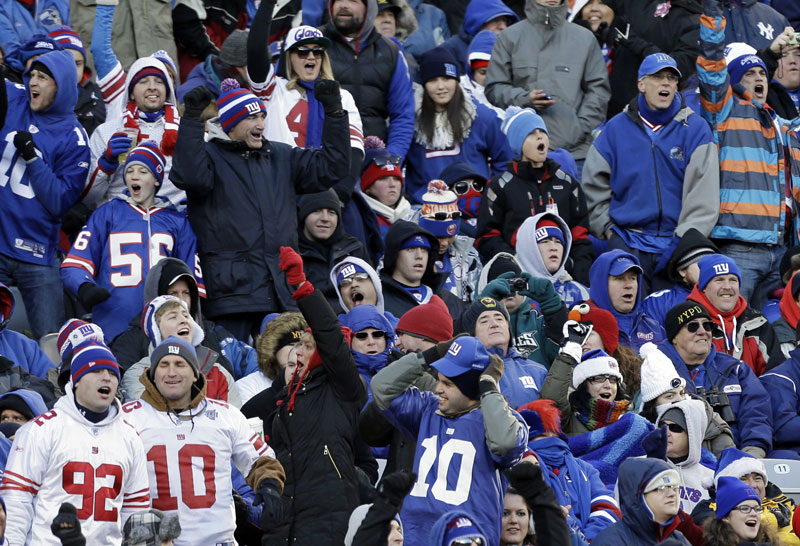NEW YORK — Amy Freeze can talk football and forecasts.
So with the Super Bowl coming to New York next year, and with local temperatures stuck in the teens, the WABC-TV meteorologist was all set to look ahead.
“Football fans like a little winter weather,” she offered on a windy Wednesday.
OK, but exactly how wintry?
Try this long-range reckoning for the matchup at MetLife Stadium, from the soon-to-be printed Farmers’ Almanac: “An intense storm, heavy rain, snow and strong winds. This could seriously impact Super Bowl XLVIII.”
Predicts editor Pete Geiger: “This is going to be one for the ages.”
“Hey, it goes with the territory,” he said by phone from Lewiston.
Way too early to say for sure what awaits fans and players in the first outdoor Super Bowl at a cold-weather site. It’ll be held Feb. 2, 2014, at the building shared by the Giants and Jets in East Rutherford, N.J.
The record low for a Super Bowl kickoff is 39 degrees when Dallas beat Miami in January 1972 at Tulane Stadium in New Orleans. It will be a lot warmer back in the Big Easy when the Baltimore Ravens and San Francisco 49ers tangle in less than two weeks. They’ll be inside the Superdome.
The NFL was aware next year’s Super Bowl could be a super brrr.
“Creating a plan for staging a Super Bowl in winter weather is not reinventing the wheel,” NFL senior vice president for events Frank Supovitz said two years ago. “Super Bowls have often been played in cities that can experience winter storms, including Detroit, Minneapolis …”
“Coordinated snow and ice removal plans for travel routes, major event facilities, the stadium campus, and parking have always been part of our planning protocol,” he said then.
Remember, no city is immune to rugged weather. Even though Green Bay and Pittsburgh played inside Cowboys Stadium two years, snow and ice blanketed the lead-up events.
Besides, a blizzard isn’t likely. The National Weather Service said the average high in nearby Newark, N.J., on Feb. 2 is 39.8 degrees and the low is 24.2. The average precipitation on that date going back to 1931 is about one-eighth of an inch.
The only significant precipitation during a Super Bowl came in February 2007 at Miami. Playing in a rainstorm, Indianapolis and Chicago committed four turnovers in the first quarter.
Expect ticket sales to be brisk next year, StubHub spokesman Glenn Lehrman said. Ticket prices are running about $3,100 for the Ravens-49ers game, and Lehrman predicted the 2014 Super Bowl would create the largest demand “we’ve ever had.”
“I think people want to be part of a first-time experience. Whatever it is,” he said.
Lehrman said because so many people live on the East Coast — within driving distance of the stadium, not needing pricey hotel rooms — cold weather wouldn’t have a chilling effect.
It certainly had an effect in New York on Wednesday. The radio hosts on WFAN began their noontime show talking about the weather; at De Witt Clinton Park in Manhattan, the artificial turf fields often occupied by pickup football games were empty.
But for a chance to see a Super Bowl, fans might sit for a few hours in a raw setting.
“You can see in Lambeau Field how they endure the cold there. They sell out there all the time, and in the Giants’ and Jets’ stadium they do the same,” New York Rangers captain Ryan Callahan said before Wednesday night’s NHL game at Madison Square Garden against the Boston Bruins.
“For an event like that I don’t think the cold weather is going to deter anybody,” said Callahan, a native of Rochester, N.Y.
Peggy Beisel-McIlwaine agreed. Her grandfather was the Packers’ first president and she recalled being in the stands for the famed Ice Bowl — the 1967 NFL championship between Green Bay and Dallas when the game-time temperature at Lambeau Field was minus-13 degrees.
“I’ve got sitting in the cold weather down to a science,” she said in an email. “Sitting at Lambeau in subzero weather is all about the clothes: Cashmere, fleece and down and, of course, Ugg boots.”
Come next year, Freeze (“that’s my real name,” she added) said the wintry conditions might be a factor. She’s seen that up close — while working four years in Chicago, she was a team meteorologist for the Bears, consulting with coaches, special teams members and equipment personnel.
“I’m always for the home-field advantage,” she said. “I think the weather will play into it.”
——
AP Sports Writer Ira Podell contributed to this report.
Send questions/comments to the editors.



Success. Please wait for the page to reload. If the page does not reload within 5 seconds, please refresh the page.
Enter your email and password to access comments.
Hi, to comment on stories you must . This profile is in addition to your subscription and website login.
Already have a commenting profile? .
Invalid username/password.
Please check your email to confirm and complete your registration.
Only subscribers are eligible to post comments. Please subscribe or login first for digital access. Here’s why.
Use the form below to reset your password. When you've submitted your account email, we will send an email with a reset code.